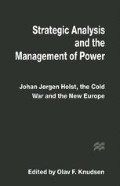Abstract
During the last five years, from the fall of the Berlin Wall in November 1989 to the final evacuation of Russian troops from Germany and the Baltic states in August 1994, so many events have been acclaimed as the end of the Cold War that it is necessary to begin this discussion with an assertion that this should be seen as a process rather than a point of time. While ‘hot’ wars do end at precise dates, the Cold War which was often as much a question of attitudes and ‘mind-sets’ as specific political or military realities has had a slower end. As Iohan jørgen Holst said in his last major speech to the Storting on 25 October 1993, ‘Periods such as this hold an inherent challenge. They force us to think along new lines, while at the same time bearing in mind the importance of permanence in a changing world.’2
Access this chapter
Tax calculation will be finalised at checkout
Purchases are for personal use only
Preview
Unable to display preview. Download preview PDF.
notes
I. This chapter represents the opinion of the author, and does not in any way commit the WEU or its Institute for Security Studies.
Foreign Minister Johan JØrgen Holst’s statement to the Storting, 25 October 1993, p. 1.
It has been suggested that this may not have been such a handicap, given the results achieved by the post-war planning carried out during the First and Second World Wars.
Author’s notes of Johan JØrgen Holst’s contribution to Alliance Review meeting, Ebenhausen, 3 March 1991.
5. Karl W. Deutsch et al., Political Community and the North Atlantic Area (Princeton, NJ: Princeton University Press, 1957), p. 5. See also discussion of this in Ian Gambles, ‘European Security in the 1990s’, Chaillot Paper no.3 (Paris: WEU Institute for Security Studies, November 1991).
Holst’s statement to the Storting, 25 October 1993, p. 9.
Pierre Hassner, ‘The evolving Europe and the West’, International Affairs, July 1990, p.463.
Holst’s statement to the Storting, 25 October 1993, p. 38.
Holst’s statement to the Storting, 25 October 1993, p. 38.
Editor information
Editors and Affiliations
Copyright information
© 1996 Norwegian Institute of International Affairs
About this chapter
Cite this chapter
Roper, J. (1996). Europe after the Cold War. In: Knudsen, O.F. (eds) Strategic Analysis and the Management of Power. Palgrave Macmillan, London. https://doi.org/10.1007/978-1-349-24608-3_7
Download citation
DOI: https://doi.org/10.1007/978-1-349-24608-3_7
Publisher Name: Palgrave Macmillan, London
Print ISBN: 978-1-349-24610-6
Online ISBN: 978-1-349-24608-3
eBook Packages: Palgrave Political & Intern. Studies CollectionPolitical Science and International Studies (R0)

